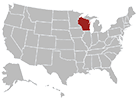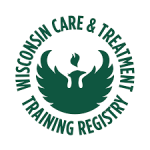
It’s not too difficult to become a Home Health Care Aide (HHA) in Wisconsin.
Usually, all you need is a little bit of paid or volunteer caretaking experience.
You can, however, decide to take Certified Nursing Assistant (CNA) training if that’s what you prefer.
Page Navigation
Licensing Requirements to Become a Home Health Aide in Wisconsin
The state of Wisconsin does have licensing requirements to become an HHA.
A similar occupation this pertains to is Personal Care Workers (PCWs).
We recommend you review licensing application information as an individual or as a personal care agency (PCA).
You can refer to the Wisconsin Department of Health and Human Services for assistance, and this includes federal licensing requirements.
You may not need to fill out a home health agency application, however, if you just provide “only personal care services.”
This includes daily living and housekeeping, and you could start immediately as an HHA in WI without a license.
It does help to gain experience though before you apply for paid positions.
For instance, you could possibly get a reference after volunteering in a nursing home on a holiday.
Whatever means you have to put yourself in caretaking environments, do it.
All of your experience will count toward a paid position and future certifications.
Regarding HHA or CNA certifications, you can find the information you need on the NCSBN website.
That’s where you will also sign up to take the NNAAP exam after you’ve completed your training.
You can also certify yourself as a CNA. Passing the NNAAP makes you eligible to become a part of the state nurse aide registry.
5 Home Health Care Schools in Wisconsin
If you can’t find a program specifically for “Home Health” care, try “Personal Care Worker” instead.
You can also search for CNA schools. Each of these three positions performs similar duties.
1. Northeast Wisconsin Technical College (NWTC)

The NWTC Personal Care Worker (PCW) certificate program will send you on your way to providing more than just basic daily living assistance.
This 30-hour program takes place in person, but you do have some class time included in it.
Your PCW training at NWTC will prepare you for repositioning patients, infection control and safety, and lab practice.
Practicing time interacting with real clients will prepare you for full-time, long-term employment. HHA tasks are performed during this training too.
2. Waukesha County Technical College (WCTC)
WCTC offers an assortment of nursing health training programs.
One of these includes the Nursing Assistant (CNA) certificate offering.
This prefers for advanced personal care in nursing homes or hospitals, and it also applies to home health care.
The WCTC CNA program runs for about 89 hours.
You will gain real-world, clinical experience working with real clients upon completion.
In addition, you will build a foundation in the core healthcare courses you take.
3. The Wisconsin Technical College System

The Wisconsin Technical College System website offers a chance to search for tech schools or community colleges all over WI.
You can seek PCW, HHA, or CNA training near Green Bay, Madison, Milwaukee, Eau Claire, and La Crosse, for example.
Online offerings also make learning for your new career more convenient.
From this, you may find openings as soon as possible working as a PCW or as a home health caregiver.
Program durations vary from several weeks to two years or more, depending on your goals.
4. Wisconsin Caregiver Academy – UW Green Bay

The University of Wisconsin at Green Bay (UW Green Bay) offers state-approved caregiver training.
This includes preparation for healthcare administrative roles.
It also provides you with the experience you need for serving an increasingly aged population.
Any training you acquire will help you serve your clients better.
That’s what this program is for.
This coursework is ideal for people starting their own agency but could work for individuals seeking employment too.
Both group and individual non-credit courses are provided.
5. CareAcademy
![]()
CareAcademy offers online training that can complement any HHA, CNA, or PCW in-person clinical training.
Talk to them about your healthcare career goals to find out if this school is right for you.
You can also verify by asking them what local employers might hire you after your training is complete.
Home Health Aide Schools in Wisconsin – Summary Table
Top 5 Schools in Wisconsin
| School Name | Address |
|---|---|
| Northeast Wisconsin Technical College | 2740 W Mason St, Green Bay, WI 54307 |
| Waukesha County Technical College | 327 E Broadway, Waukesha, WI 53186 |
| The Wisconsin Technical College System | 4622 University Avenue Madison, WI 53705 |
| Wisconsin Caregiver Academy – UW Green Bay | 2420 Nicolet Dr, Green Bay (WI), 54311 |
| Care Academy |
Salary
The average WI annual Home Health Care Aide salary is about $27,269.
It ranges from $23,616-$32,940.
That’s more than likely for entry-level positions.
After a couple of years and maybe a CNA or LPN certificate, your income could rise to at least $35,000-$40,000 per year or more.
The further you advance in your nurse training, the more you can earn, which could eventually be $80,000-$100,00 or more per year as an RN.
Annual Salary Range:Average Salary of Home Health Aides in Wisconsin
| City Name | Salary |
|---|---|
| Milwaukee | $27,269 |
| Madison | $26,997 |
| Green Bay | $26,432 |
| Kenosha | $27,068 |
| Racine | $27,068 |
| Appleton | $26,437 |
| Waukesha | $27,166 |
| Oshkosh | $26,266 |
| Eau Claire | $25,689 |
| La Crosse | $25,161 |
Regional Salary in Wisconsin
| Region | Employed | Avg. Annual Salary | Avg. Hourly Pay | Top 10% Annual Salary | Bottom 10% Annual Salary |
|---|---|---|---|---|---|
| Appleton, WI | 2,430 | $33,020 | $15.87 | $37,610 | $24,280 |
| Eau Claire, WI | 2,350 | $32,270 | $15.52 | $36,710 | $27,320 |
| Fond du Lac, WI | 830 | $31,080 | $14.94 | $37,250 | $22,450 |
| Green Bay, WI | 3,190 | $32,080 | $15.42 | $37,890 | $23,680 |
| Janesville-Beloit, WI | 1,470 | $32,610 | $15.68 | $38,670 | $26,780 |
| La Crosse-Onalaska, WI-MN | 1,670 | $33,870 | $16.29 | $41,930 | $25,760 |
| Madison, WI | 6,930 | $34,290 | $16.49 | $38,730 | $27,180 |
| Milwaukee-Waukesha-West Allis, WI | 29,710 | $31,160 | $14.98 | $37,290 | $23,080 |
| Oshkosh-Neenah, WI | 1,800 | $31,610 | $15.2 | $36,800 | $25,570 |
| Racine, WI | 2,920 | $32,750 | $15.74 | $37,020 | $23,110 |
| Sheboygan, WI | 1,160 | $32,150 | $15.46 | $37,450 | $26,490 |
| Wausau, WI | 1,180 | $31,830 | $15.31 | $36,930 | $22,440 |
* Employment conditions in your area may vary.
Frequently Asked Questions
Is there a high demand for home health aids?
It might amaze you to find out that the job growth outlook for home health aids may increase by 25% until 2030.
In 2021, more than 3.6 million job openings were posted, and the aging population has increased this demand.
It shouldn’t be hard to find your place in this field, especially if you stay healthy as you age.
How much education does an HHA in Wisconsin need?
Home health aides and personal care workers in WI just need a high school diploma or equivalent certificate.
However, post-secondary training raises your salary and increases the number of opportunities open to you.
You’re also given more responsibility if you train for more, but you might start with a six-week course.
What is the difference between a CNA and a home health care worker?
A home healthcare worker may only work with one client at a time.
A CNA may work with several in a group home or nursing home setting.
That doesn’t mean that you only have one client as an HHA or PCW.
You might serve two or three in a day or week, depending on how many hours you work and their needs.
How much does WI home health care aid training cost?
Just to get started, you may just need to take one or two adult education classes.
That training, including tuition, books, and fees, may run you less than $1,000.
If you take a certificate course, which might only take several weeks, it could run you $2,000 or more, and semester-long programs may cost $5,000 or more.
Consider your career goals carefully, and check into state or local workforce funding or federal financial aid to cover costs.





